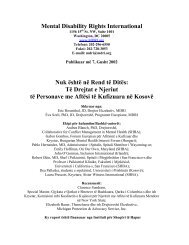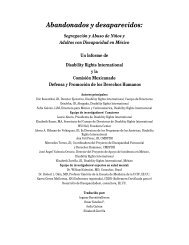Torture not Treatment - Disability Rights International
Torture not Treatment - Disability Rights International
Torture not Treatment - Disability Rights International
You also want an ePaper? Increase the reach of your titles
YUMPU automatically turns print PDFs into web optimized ePapers that Google loves.
TORTURE NOT TREATMENT<br />
to use positive supports, the US Department of Education has certified JRC as a school that can<br />
receive federal funds. 164<br />
The Americans with Disabilities Act (ADA) does provide protections against discrimination on<br />
the basis of disability. And in 1975, Congress passed the ―Developmental Disabilities Assistance<br />
and Bill of <strong>Rights</strong> Act‖ (DD Act) which states in part:<br />
…The Federal Government and the States both have an obligation to ensure that<br />
public funds are provided only to institutional programs, residential programs, and<br />
other community programs, including educational programs in which individuals with<br />
developmental disabilities participate, that… meet minimum standards relating to—<br />
provision of care that is free of abuse, neglect, sexual and financial<br />
exploitation, and violations of legal and human rights and that subjects<br />
individuals with developmental disabilities to no greater risk of harm than<br />
others in the general population… and prohibition of the use of such restraint and<br />
seclusion as a punishment or as a substitute for a habilitation program… 165<br />
However, in a class action suit filed in federal district court - the Pennhurst State School and<br />
Hospital v. Halderman - on behalf of all Pennhurst School residents alleging inhuman and<br />
dangerous conditions at the school, the US Supreme Court ruled that the DD Act did <strong>not</strong> create<br />
any new legal rights or protections and the language of the DD Act was ―horatory <strong>not</strong><br />
mandatory.‖ 166<br />
…the Act does no more than express a congressional preference for certain kinds of<br />
treatment. – US Supreme Court<br />
In theory, treatment that subject children with disabilities to harm could be struck down by the<br />
courts as a violation of the DD Act and ADA. In practice, they have <strong>not</strong> done so.<br />
Lack of protection under State Law<br />
In the absence of federal law that would limit aversive treatment, states have the ability to use<br />
and regulate aversives as they see fit. Massachusetts and New York have adopted laws and<br />
regulations on aversive treatment, as have some of the other states that send children to JRC. As<br />
described above, JRC moved from California to Rhode Island when California adopted<br />
regulations that made it almost impossible to use aversives. Ultimately, federal law is needed to<br />
ensure that the protections under international human rights law are implemented throughout the<br />
country. Since JRC is based in Massachusetts, this analysis will focus on Massachusetts law.<br />
The Massachusetts regulations from the Department of Developmental Services (DDS) create<br />
protections that appear relevant, but they include exceptions that permit aversives essentially<br />
without limitation as to intensity or duration. The general policy against aversives that pose a<br />
―significant risk‖ are stated in the introduction to the regulation:<br />
29




